Hello tarot lovers, learners, cynics and people who clicked here by accident! If you’re especially observant you may have noticed that our fortnightly Tarot School column mysteriously skipped an issue recently. The reason is… well, um, err… I forgot to write it. Because I was getting a civil partnership and having the kind of honeymoon which involves leaving your home of ten years and moving the two canal boats on which you and your partner and a dog and two cats live from the country to the city in a kind of brilliant exhausting boot-camp style. No biggie.
Anyway enough about my strange life, let’s just crack on with learning things about tarot! This time around I want to talk about the ‘people’ of the tarot – the pages, knights, kings and queens that make up the tarot’s ‘court’. These sixteen court cards are notoriously tricky to interpret, with beginners and seasoned readers alike often struggling to understand their meaning in tarot readings.
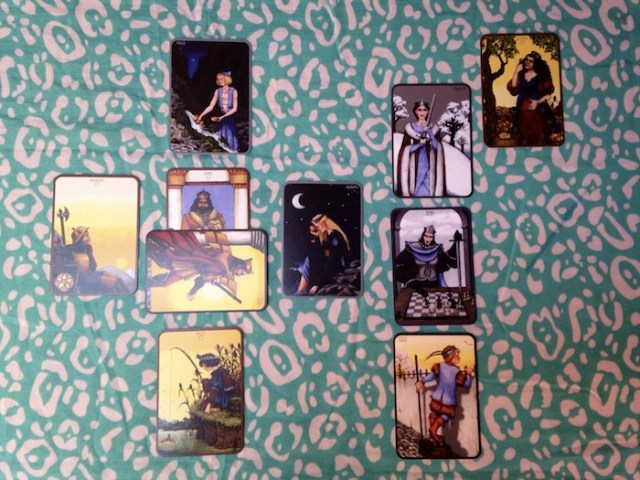
It’s often said that court cards represent actual people in the querent’s life – family members, friends, colleagues, or perhaps strangers yet-to-be met. I often find this to be true, but this can make these cards all the more difficult to read, as you try to ‘fit’ the card to a person you can think of. Personally, I find that these cards are more likely point to an aspect of a person (often the querent themselves) such as a way they’re responding to a situation, or an energy they’re bringing to a relationship.
Many books (including, sadly, my beloved Wild Unknown Tarot Guidebook) set out to physically describe the people these cards represent. For example, some books and websites actually suggest the hair colour and skin tone of the person each court card is pointing to.
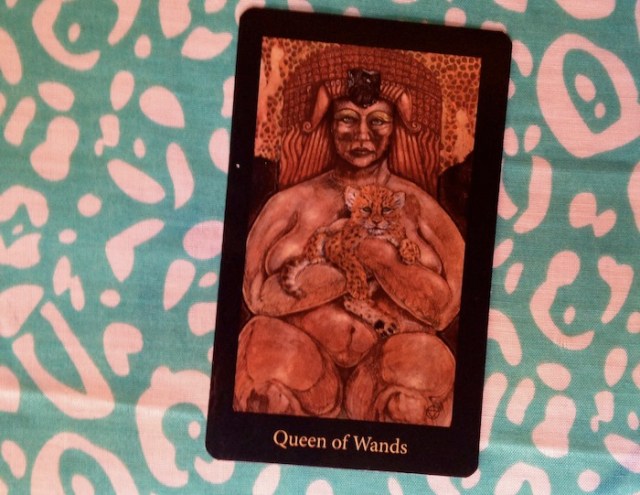
Whilst occasionally a card might look so damn similar to someone you know that it seems obvious that it’s them, in general I find this approach incredibly reductionist and completely unhelpful in reading the cards. To me, an important thing to understand about court cards is that, although they are the ‘characters’ of the tarot, they don’t represent full, rounded, complete people, and therefore can’t be described as quoted above. It’s more that they are dimensions of a person’s character.
So what ‘dimensions’ am I talking about? The way I see it is that the four court cards represent four separate life stages — four degrees of maturity in handling the powers of their suit. Roughly speaking I assign these degrees of maturity as follows.
Also, if you’re unsure of the four suits in tarot and what they represent, here’s a short guide I wrote for Autostraddle a while back.
Page
As the ‘child’ of the tarot, this is someone who is just ‘discovering’ their suit, who is open to new experiences, who’s mind or heart is not made up, who is eager to learn and develop, who is at the start of something. So for example, the Page of Cups is someone who is going into the world openheartedly, ready to love or find new ways of loving, eager to develop emotionally.
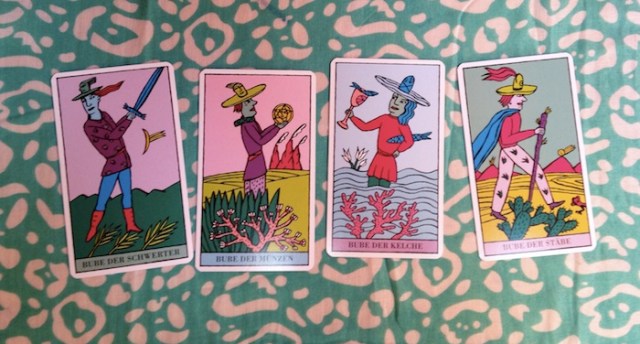
Knight
Like a super-confident teenager, this is someone who kinda thinks they know it all when it comes to their suit, who goes at stuff in a totally gung-ho way, fixed on their mission without the maturity yet to see all sides of their situation. So the Knight of Pentacles works tirelessly on a single task — because it’s like *the most important thing ever* — and the Knight of Swords dashes off heroically to seek justice on the strength of just one side of the story.
Because they are so black and white about things, the knights carry a sense of duality. On the one hand a single-minded approach can be damaging, but at other times it that passionate teenage-type energy might be just what a situation needs. I really love Joan Bunning’s writing about the knights. On learntarot.com when describing each of the four knights she asks “is this card’s energy helping or hindering?”
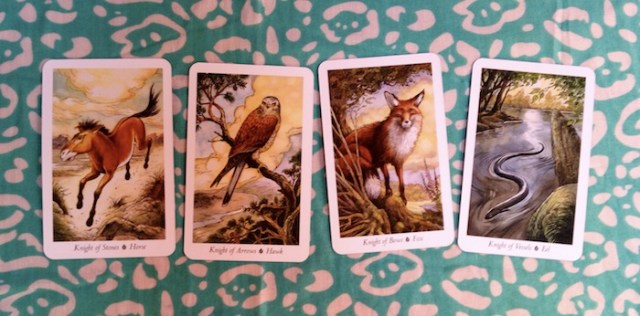
King
This person has ‘mastered’ their suit and knows how to use it in an external way to advance themselves and strengthen their position in the community. They use their powers to influence others and get what they need. So the King of Pentacles could be a sound businesswoman who donates to worthy causes, the King of Wands might be a motivational speaker or head of some project everyone wants to be part of.
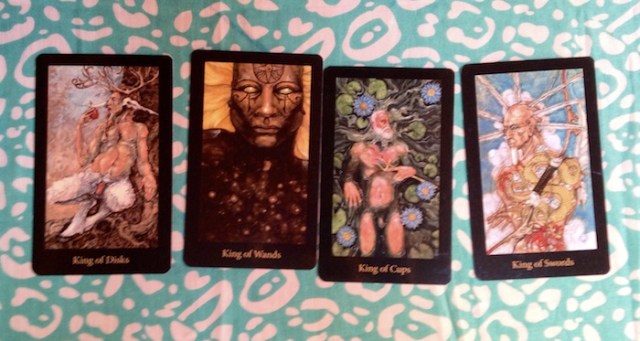
Queen
This person is more mature still, having a deeper understanding of their suit and how it works within themselves. They know how to use their powers creatively to develop as people, and how to share this with others. They are able to exude the power of their suit, helping others to enjoy and develop that element of themselves, too. The Queen of Cups might be an musician whose songs are a powerful expression of his own heart, but when other people listen, they find that they recognise their own feelings there too.
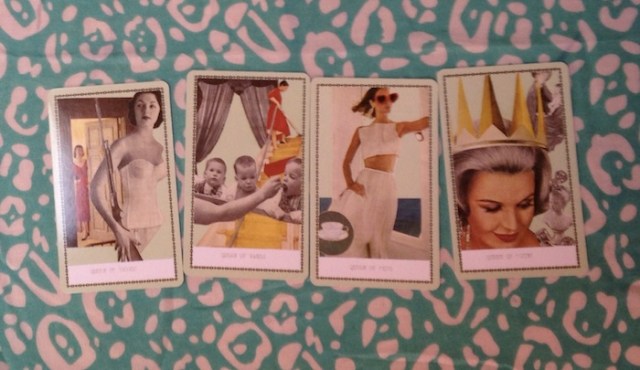
The Collective Tarot has a great take on this, referring to pages, knights, queens and kings as seeker, apprentice, artist and mentor respectively. This is a really helpful way to think about the court cards in whatever deck you happen to be using – each of these roles describes a different level of maturity/ability when it comes to accessing and using the card’s suit.
So how to read these cards in an actual tarot reading?
Depending on position, context or the question asked, here are a few ways I might interpret court cards in a reading:
- What the querent is bringing to the situation, or how they are responding to it
- What someone else is bringing / how they are responding
- The type of energy the situation needs, an attitude to adopt
- A recognisable person in the querent’s life
- An ‘ideal person,’ a type of person the querent longs for
- An influencing energy, not necessarily from a person but perhaps from a structure or institution (e.g. King of Pentacles — strict rules at work)
A fun way to get more familiar with the court cards is to think of them as people. One-dimensional people, yes, but people you can play with, make up stories about, play Barbie and Ken with. Try matching them to your friends — that can be pretty fun! As in ‘OMG she’s being *such* an aloof King of Swords right now!’ Or try associating them with celebrities or politicians. On my own tarot blog, I wrote about matchmaking with the court cards, and I also made up a silly soap opera based on those sixteen characters.
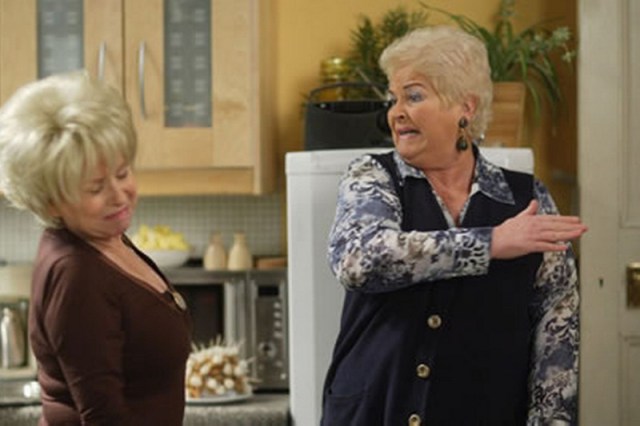
Lastly, if you’re really interested in court cards, Scottish tarot reader Alison Cross writes a blog exclusively about them called This Game of Thrones. It’s lighthearted and practical and a good read to help you get to know the ‘characters’ of the court.
What about you?
Got a favourite court card? Ever dated an obsessive Knight of Cups or a damaged Queen of Swords? Which court card best represents you… and just how do you feel about that? Share your ideas with us in the comments!








Comments
Ya know, I rarely pull court cards. Oh golly, maybe my deck is as self-centered as I am.. XD
Ha!! Wow. I seem to get several in every reading…maybe it’s all the voices in my head :P
Pam St Clement FTW! Best photo ever.
Also super intrigued to use Tarot as an aid to self reflection…this has definitely got me thinking.
Pat Butcher is my number one hero.
Those earrings…Amaze. Isn’t she married to Hyacinth Bucket…?
Had a google. No confirmation or denial of Pam St Clement and Patricia Routledge. Suppose we’ll never know for sure. Either way, two of my favourite actresses from childhood. Hetty Wainthrop Investigates anyone?
No way. Someone did not just reference Keeping Up Appearances on AS. Ahhhhhh I don’t know ANYONE who has watched that, but I grew up with it on PBS!! :D
Beth. As someone who has recently been getting into tarot for the first time, I LOVE this column. It has been very useful and full of insight. Congrats on your civil partnership!
Thanks Monae! It’s always great to hear these posts are genuinely useful :D good luck on your new tarot journey, how exciting! x
Also @monae and others – there’s a tarot school group right here on Autostraddle where peeps chat about tarot: http://develop.autostraddle.com/groups/tarot-school/
Worth a look!
Super interesting! I’m going to sit and think about which court card I am for the next 15 minutes haha. Congratulations on your civil partnership!!! :D
I identify with a few different court cards… I’m definitely a Cups/Pents kind of person though. I aspire to be the Queen of Cups, but maybe I’m still a Page. ^_^ I have a fondness for the Knight of Pentacles. I’m not as “conservative” as he’s sometimes interpreted to be, but the slow and steady work ethic is inspiring!
And congrats on your civil partnership and move!!
I am in a bit of a rush this morning and won’t have time to read this article in full until later, but I just want to say that your home sounds wonderful. If it’s not too weird, can we ask you more about what it’s like to live in a longboat?
*narrowboat.
Shows what I know… Whoops.
Hehe! Well it’s very small and it bobs around a lot. It’s very challenging and very simple at the same time.
If you’re reeeeally interested I write about it here: http//narrowboatswallow.co.uk xxx
Why do you say “damaged” Queen of Swords? I’ve never seen her described as such before, and it’s an interesting descriptor to me because while I see her as incredibly functional (the intuitive opposite of “damaged”), I think her particular kind of understanding is the sort that often only comes from some serious mental/emotional trial by fire, and calling her damaged is coherent with that.
Incidentally, since you ask, she’s “my” card. xD Also my girlfriend’s. The Queen of Swords’s energy is that which we both aspire to and value in ourselves, and we tend to amplify those traits in each other when we’re working together on something.
The Page of Swords always makes me smile (and sometimes cry a little, tbh), when she comes up in my readings for myself, because where I am in life right now (struggling with a very recalcitrant research project to finish my PhD), she always seems to be telling me to remember why I want to Do Science in the first place, to remember that starry-eyed enthusiasm that I often find very hard to access, these days.
WTB comment edit feature; realized I’m kinda repeating myself from a previous comment on a previous tarot post, but THE QUESTION STILL STANDS. xD I love this series, and congratulations on your partnership and move!
Hmm yeah ‘damaged’ might not have been the best choice of word! The way I often see the Queen of Swords is as someone who has been through *a lot* – the entire swords sequence many times – their incredible strength is in the ability to turn those difficult experiences into lessons and be all the wiser and better adjusted for it.
I think it’s an awesome card to identify with, it’s actually one of my favourite in the tarot and like you and your GF I really aspire to its energy. We all carry shit from the past and the Queen of Swords has a share of scars, but knows how to move on and help others to do the same.
Dated a very much Knight of Pentacles, never again dear deities never again.
Lately I’ve been drawing the Knight of Pentacles a lot–seemingly in every spread I do. I’m never sure whether it’s telling me, “buckle down at work! focus! less time on the internet!” or if it’s warning me that I’m too focused on practical concerns to the detriment of my imagination.
My favorite court card is probably Queen of Cups. I like that she’s so in touch with her emotions and her intuition. I find her presence comforting.
Then there are the court cards that I don’t know what to do with–namely, Queen of Pentacles and Knight of Wands. I see their energies and think, “well, that’s very nice, but it’s not me and it’s probably never going to be.”
Great piece! I was just reading your blog – my parents also have a boat on the Rochdale Canal. One of the best text messages I ever got from her was this:
(by ‘her’ I mean my mum)
Haha! Sounds about right. Where are your parents based @alphalpha?
They are usually based near Sowerby Bridge but this summer they have gone on a little adventure (or big adventure in canal terms!) down to Oxford and are currently near Banbury. I think the plan is to moor down there for a while before making a slow journey back up to Sowerby after Christmas, possibly by way of Llangollen. Llangollen is an incredible stretch of the canal if you ever get to visit, it is so beautiful and surreal – I read lots of ghost novels while we travelling along in and spooked myself out.
Very jealous of where you are based though – the Rochdale Canal is an amazing area of the country!
I know I’m really late to the convo here but super congrats on the civil partnership and moving!!! Also, another great post. Thanks!
Very late to the convo but really enjoying your posts as I go through. Thinking of court cards as aspects of people or as aspects of myself is v. useful — this is a much needed revision because, like you say, I find the “this represents this person” based on looks or position (e.g. queen or king must be mature physically) to be v. reductive.
When I am represented by a court card, I most often show up as the Queen of Swords, and sometimes by the Queen of Wands or the Queen of Cups. But always a queen, which is v. interesting.